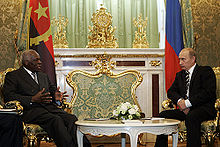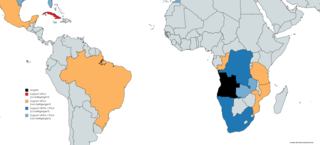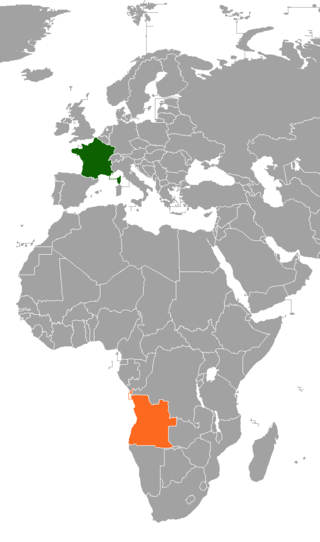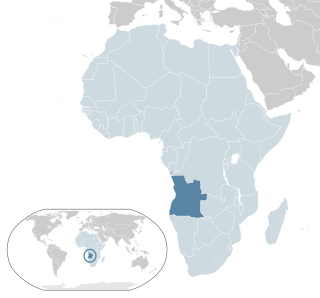 | |
Angola | Russia |
|---|---|
Russia has an embassy in Luanda. Angola has an embassy in Moscow and an honorary consulate in Saint Petersburg. Angola and the precursor to Russia, the Soviet Union, established relations upon Angola's independence.
 | |
Angola | Russia |
|---|---|
Russia has an embassy in Luanda. Angola has an embassy in Moscow and an honorary consulate in Saint Petersburg. Angola and the precursor to Russia, the Soviet Union, established relations upon Angola's independence.


Soviet–Angolan relations were strained at times during the 1980s, in part because Angola sought to upgrade diplomatic ties with the United States. Soviet leadership factions were divided over their nation's future role in Africa, and some Soviet negotiators objected to Angolan President José Eduardo dos Santos's concessions to the United States on the issue of "linkage". The region's intractable political problems, and the cost of maintaining Cuban troop support and equipping the MPLA-PT, weakened the Soviet commitment to the building of a Marxist-Leninist state in Angola.[ citation needed ]
Angolan leaders, in turn, complained about Soviet neglect—low levels of assistance, poor-quality personnel and matériel, and inadequate responses to complaints. Angola shared the cost of the Cuban military presence and sought to reduce these expenses, in part because many Angolan citizens felt the immediate drain on economic resources and rising tensions in areas occupied by Cuban troops. Moreover, dos Santos complained that the Soviet Union dealt with Angola opportunistically—purchasing Angolan coffee at low prices and re-exporting it at a substantial profit, overfishing in Angolan waters, and driving up local food prices. [1]
Angola condemned Russia regarding the Russian invasion of Ukraine. [2]
Compared to the Soviet era, trade between Russia and Angola is now quite minimal. In 2016, exports from Russia to Angola amounted to US$567.9 million and Angolan exports to Russia amounted to just US$14,942. [3]
During 2017 to 2021, exports from Russia to Angola were much lower with US$184m in 2021, imports from Angola were US$425,380 during 2021.

Cuba's foreign policy has been fluid throughout history depending on world events and other variables, including relations with the United States. Without massive Soviet subsidies and its primary trading partner, Cuba became increasingly isolated in the late 1980s and early 1990s after the fall of the USSR and the end of the Cold War, but Cuba opened up more with the rest of the world again starting in the late 1990s when they have since entered bilateral co-operation with several South American countries, most notably Venezuela and Bolivia beginning in the late 1990s, especially after the Venezuela election of Hugo Chávez in 1999, who became a staunch ally of Castro's Cuba. The United States used to stick to a policy of isolating Cuba until December 2014, when Barack Obama announced a new policy of diplomatic and economic engagement. The European Union accuses Cuba of "continuing flagrant violation of human rights and fundamental freedoms". Cuba has developed a growing relationship with the People's Republic of China and Russia. In all, Cuba continues to have formal relations with 160 nations, and provided civilian assistance workers – principally medical – in more than 20 nations. More than one million exiles have escaped to foreign countries. Cuba's present foreign minister is Bruno Rodríguez Parrilla.

The Angolan Civil War was a civil war in Angola, beginning in 1975 and continuing, with interludes, until 2002. The war began immediately after Angola became independent from Portugal in November 1975. It was a power struggle between two former anti-colonial guerrilla movements, the communist People's Movement for the Liberation of Angola (MPLA) and the anti-communist National Union for the Total Independence of Angola (UNITA).

The South African Border War, also known as the Namibian War of Independence, and sometimes denoted in South Africa as the Angolan Bush War, was a largely asymmetric conflict that occurred in Namibia, Zambia, and Angola from 26 August 1966 to 21 March 1990. It was fought between the South African Defence Force (SADF) and the People's Liberation Army of Namibia (PLAN), an armed wing of the South West African People's Organisation (SWAPO). The South African Border War resulted in some of the largest battles on the African continent since World War II and was closely intertwined with the Angolan Civil War.

Soviet foreign trade played only a minor role in the Soviet economy. In 1985, for example, exports and imports each accounted for only 4 percent of the Soviet gross national product. The Soviet Union maintained this low level because it could draw upon a large energy and raw material base, and because it historically had pursued a policy of self-sufficiency. Other foreign economic activity included economic aid programs, which primarily benefited the less developed Council for Mutual Economic Assistance (COMECON) countries of Cuba, Mongolia, and Vietnam.

After the establishment of diplomatic ties with the Soviet Union after the Cuban Revolution of 1959, Cuba became increasingly dependent on Soviet markets and military aid and was an ally of the Soviet Union during the Cold War. In 1972 Cuba joined the COMECON, an economic organization of states designed to create co-operation among the communist planned economies, which was dominated by its largest economy, the Soviet Union. Moscow kept in regular contact with Havana and shared varying close relations until the end of the Soviet Union in 1991. Cuba then entered an era of serious economic hardship, the Special Period.

Angola and the United States have maintained cordial diplomatic relations since 1993. Before then, antagonism between the countries hinged on Cold War geopolitics, which led the U.S. to support anti-government rebels during the protracted Angolan Civil War.
In the 1980s in Angola, fighting spread outward from the southeast, where most of the fighting had taken place in the 1970s, as the African National Congress (ANC) and SWAPO increased their activity. The South African government responded by sending troops back into Angola, intervening in the war from 1981 to 1987, prompting the Soviet Union to deliver massive amounts of military aid from 1981 to 1986. The USSR gave the Angolan government over US$2 billion in aid in 1984. In 1981, newly elected United States President Ronald Reagan's U.S. assistant secretary of state for African affairs, Chester Crocker, developed a linkage policy, tying Namibian independence to Cuban withdrawal and peace in Angola.

Relations between Angola and South Africa in the post-apartheid era are quite strong as the ruling parties in both states, the African National Congress in South Africa and the MPLA in Angola, fought together during the Angolan Civil War and South African Border War. They fought against UNITA rebels, based in Angola, and the apartheid-era government in South Africa which supported them. Nelson Mandela mediated between the MPLA and UNITA during the final years of the Angolan Civil War. Although South Africa was preponderant in terms of relative capabilities during the late twentieth century, the recent growth of Angola has led to a more balanced relation.

Relations between France and Angola have not always been cordial, due to the former French government's policy of supporting militant separatists in Angola's Cabinda Province. The international Angolagate scandal embarrassed both governments, by exposing corruption and illicit arms deals. Following French President Nicolas Sarkozy's visit in 2008, relations have improved.

Soviet–Angolan relations were close until the Angolan government renounced Marxist-Leninism in 1990 and adopted a pro-Western foreign policy. The close, personal relationship between President Agostinho Neto and Cuban leader Fidel Castro complicated the Soviet Union's involvement in the Angolan Civil War and foiled several assassination attempts against Neto.

Relations between Angola and Nigeria are primarily based on their roles as oil exporting nations, are cooperative and sturdy. Both are members of the Organization of the Petroleum Exporting Countries, the African Union and other multilateral organizations.

Russia–South Africa relations are foreign relations between Russia and South Africa. Full diplomatic relations were established between both countries in 1942 as the Soviet Union. Russia has an embassy in Pretoria and a consulate-general in Cape Town. South Africa has an embassy in Moscow. Both countries are also members of BRICS.
Grenada-Soviet Union relations refers to the relations between Grenada, and the Soviet Union. Diplomatic relations between Grenada and the Soviet Union were severed in November 1983 by the Governor General of Grenada. Eventually in 2002, Grenada re-established diplomatic relations with the newly formed Russian Federation.

Kenya–Russia relations are bilateral relations between Kenya and Russia. Russia had established diplomatic relations with Kenya on December 14, 1963, and has since maintained good relations with the African Great Lakes country.

Russia–Zambia relations are the bilateral relations between Russia and Zambia.
The Cuban sugar economy is the principal agricultural economy in Cuba. Historically, the Cuban economy relied heavily on sugar exports, but sugar production has declined since the breakup of the Soviet Union in 1991. In 2015, raw sugar accounted for $378 million of Cuba's $1.4 billion exports.

Angola–India relations refers to the international relations that exist between Angola and India.

Angola–Mexico relations are the diplomatic relations between the Republic of Angola and the United Mexican States. Both nations are members of the United Nations. Neither country has a resident ambassador.

Africa–Soviet Union relations covers the diplomatic, political, military, and cultural relationships between the Soviet Union and Africa from the 1945 to 1991. The Soviets took little interest until the decolonisation of Africa of the 1950s and early 1960s which created opportunities to expand their influence. Africans were not receptive to the Soviet model of socio-economic development. Instead, the Soviets offered financial aid, munitions, and credits for purchases from the Soviet bloc, while avoiding direct involvement in armed conflicts. Temporary alliances were secured with Angola and Ethiopia. The 1991 dissolution of the Soviet Union left its successor state, Russia, with greatly diminished influence.

The recorded history of the Jews in Angola stretches from the Middle Ages to modern times. A very small community of Jews lives in Angola mostly in the capital city of Luanda with a handful scattered elsewhere of mixed origins and backgrounds. There are also a number of transitory Israeli businesspeople living in Angola.